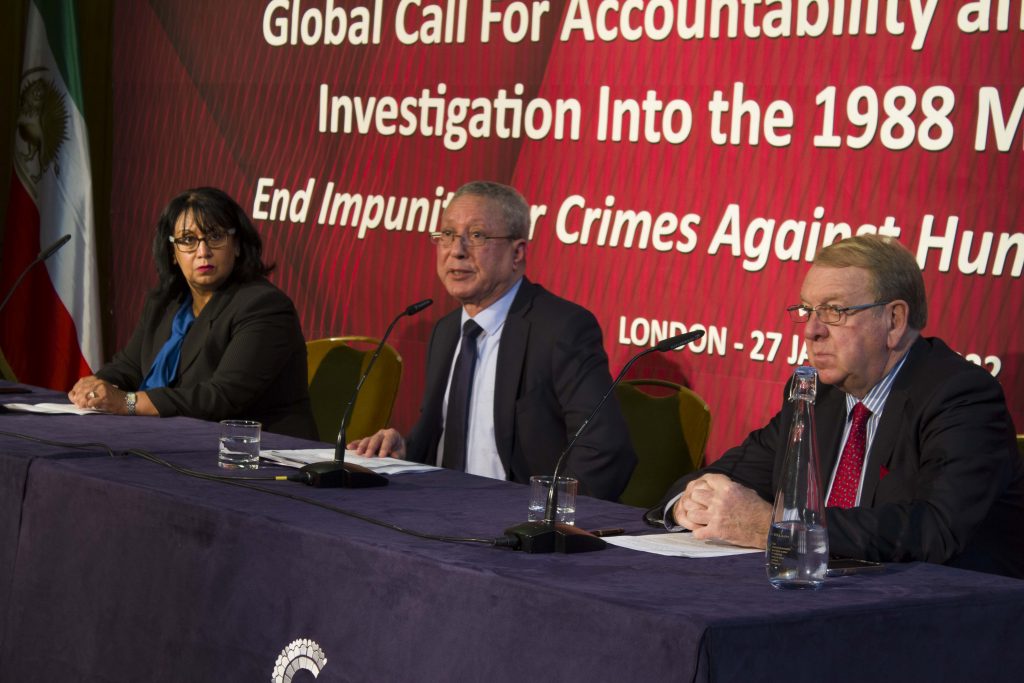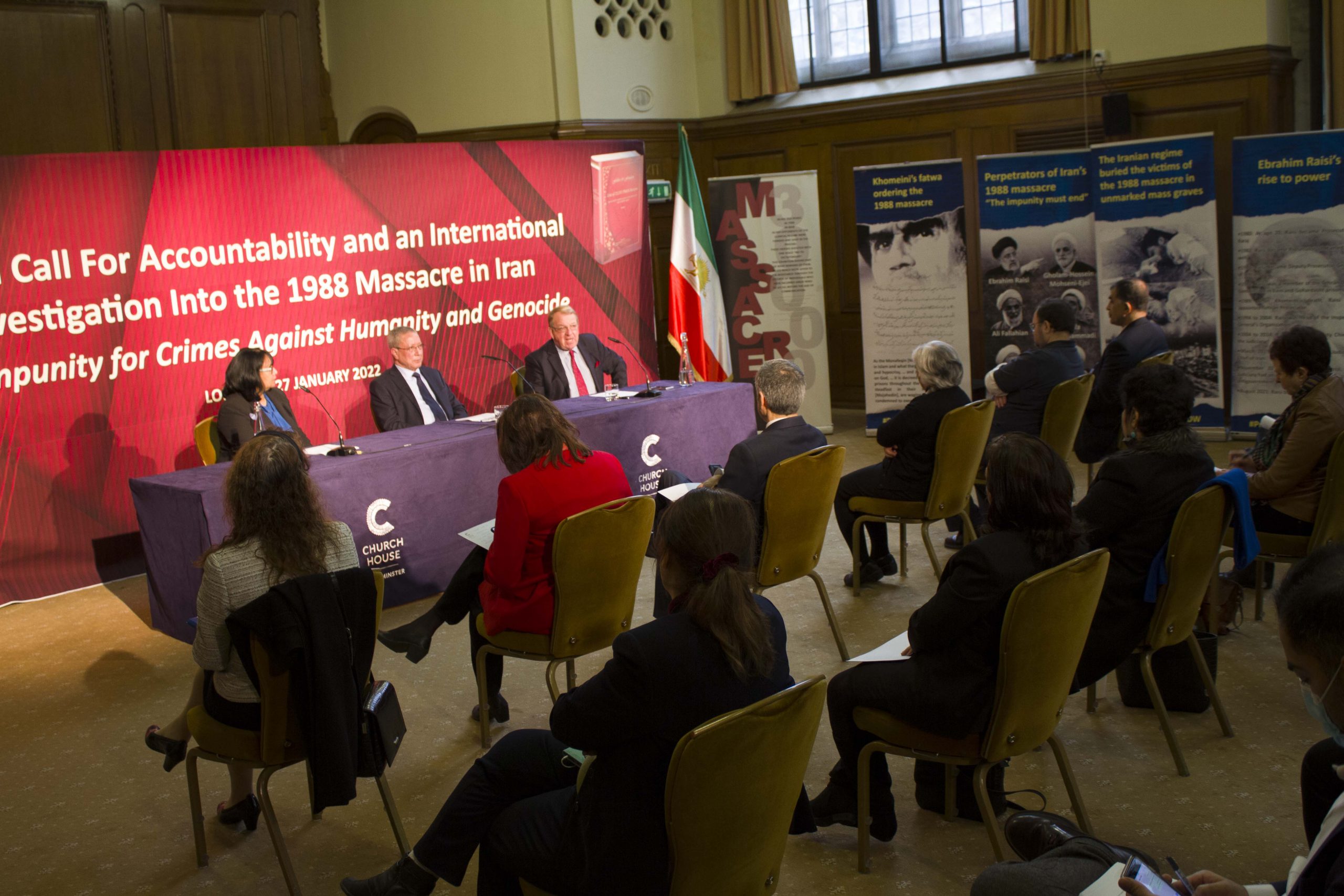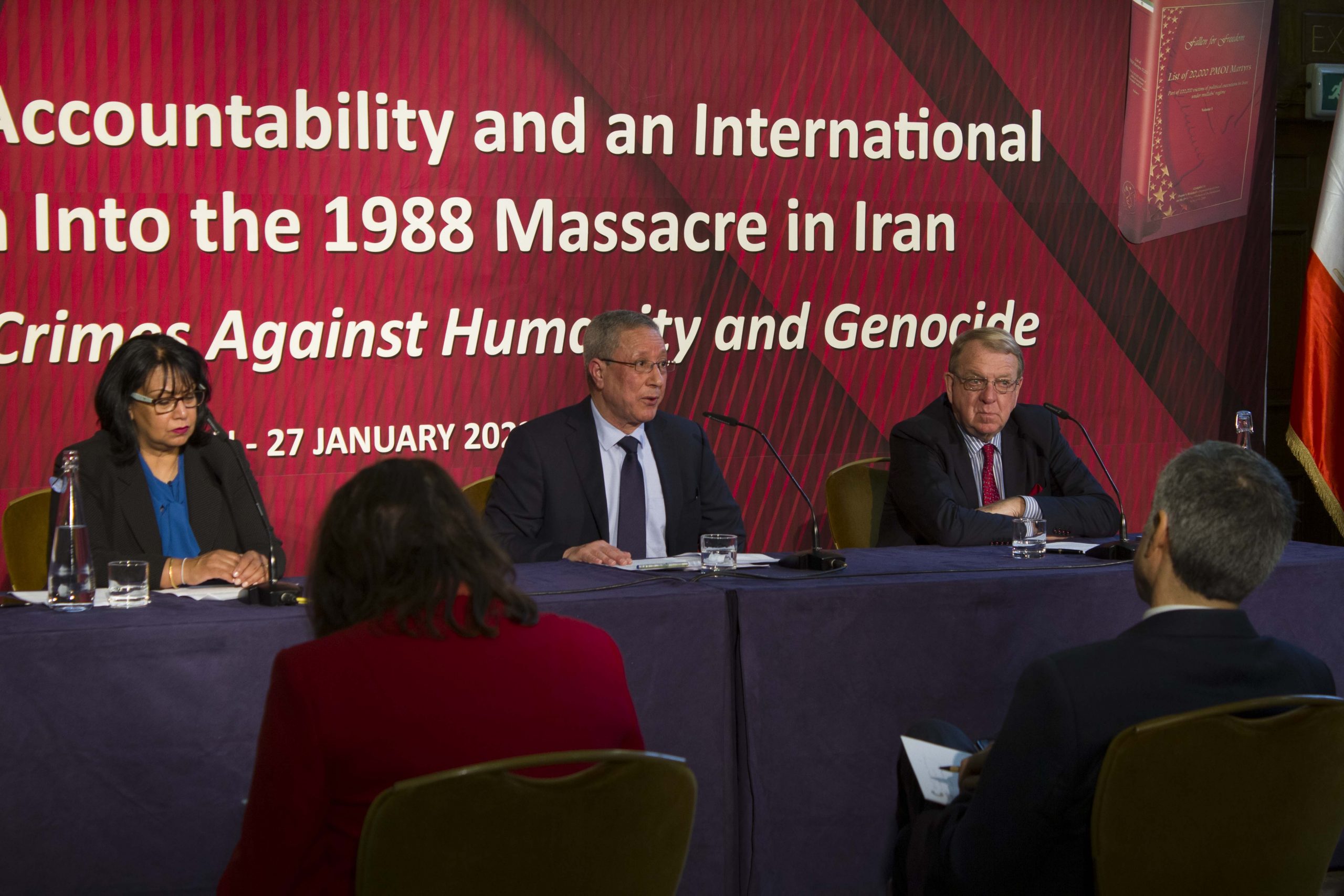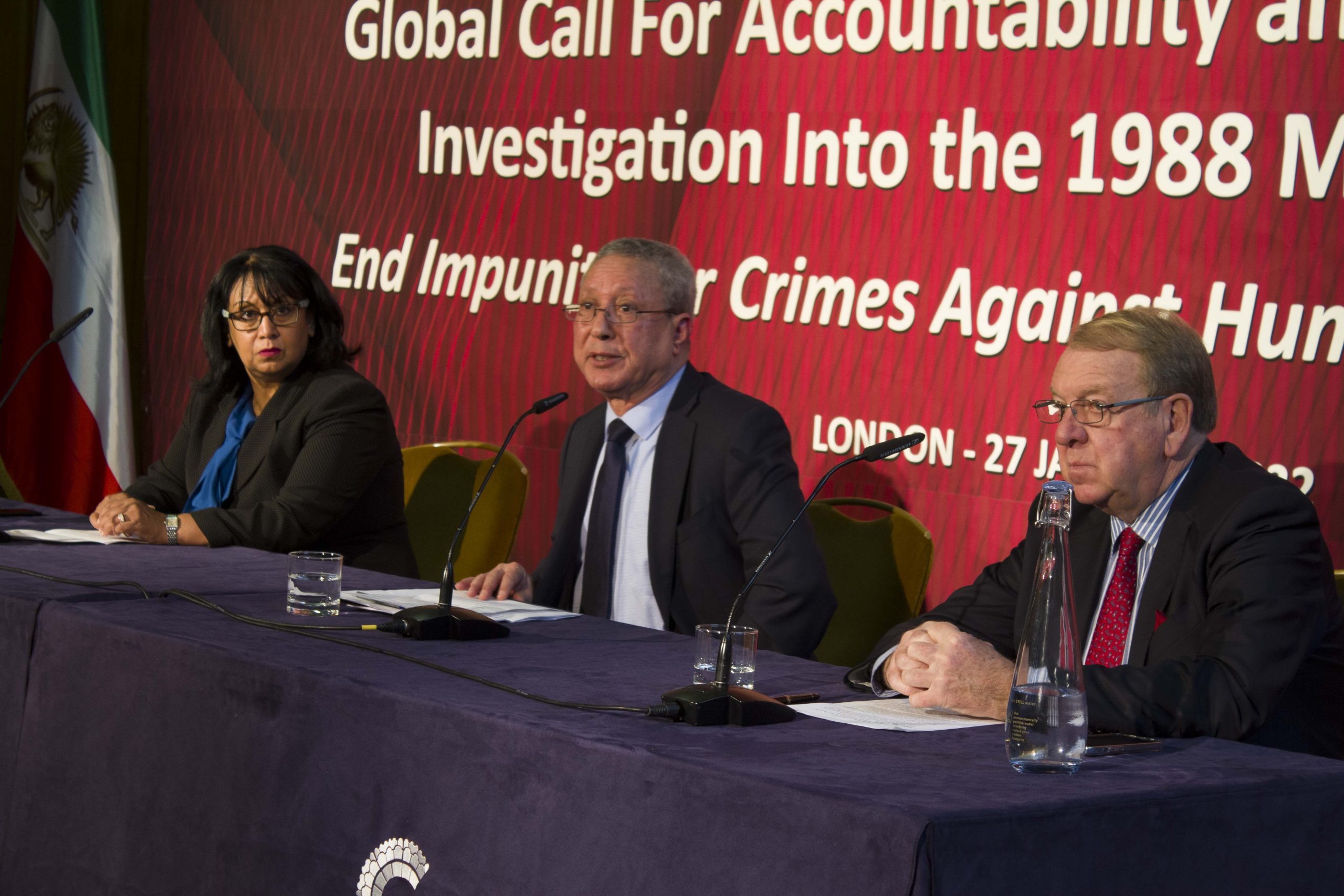Iran’s current President Ebrahim Raisi and Judiciary Chief Gholam-Hossein Mohseni Ejei singled out as key perpetrators of the 1988 massacre
LINK to profiles of signatories of the open letter
Hundreds of international human rights and legal experts, including the former head of the International Criminal Court and more than 100 current and former United Nations officials, in letters to the UN Human Rights Council and High Commissioner for Human Rights said the 1988 massacre of political prisoners in Iran is believed to amount to “crimes against humanity” and “genocide,” and they called for the establishment of an international inquiry that would bring its perpetrators to justice.
The letters were unveiled at a press conference in London on 27 January 2022 organised by Justice for the Victims of the 1988 Massacre in Iran (JVMI).
In the summer of 1988 based on a fatwa by Iran’s Supreme Leader, Ayatollah Ruhollah Khomeini, as many as 30,000 political prisoners were extra-judicially executed or forcibly disappeared. Victims were from various political groups. The majority were activists of the People’s Mojahedin Organisation of Iran (PMOI or MEK).
Altogether 470 individuals and organisations, representing the global human rights community at large, have co-signed the open letter to the Human Rights Council, dated 25 January 2022 and organised by Justice for the Victims of the 1988 Massacre in Iran (JVMI).
“Human rights experts believe that the extrajudicial executions in 1988 in Iran amount to crimes against humanity and genocide,” the signatories said.
The signatories include a former President of the International Criminal Court (ICC), a former President of the UN Human Rights Council, a former President of the UN Security Council, a former President of the European Commission, three former Presidents of the Inter-American Commission on Human Rights (IACHR), a former President of the Court of First Instance of the European Communities, a former President of the OSCE Court of Conciliation and Arbitration, a former NATO Commander, a former President of the Appeals Division of the ICC, a former President of the Council of the European Union, a former President of the European Commission of Human Rights, a former Chairman of the UN International Law Commission, 19 Nobel laureates, 108 current and former UN officials, including 39 former UN Special Rapporteurs.
Other notable signatories include a former Special Adviser to the UN Secretary General on the Prevention of Genocide, two former Special Advisers to the UN Secretary General on the Responsibility to Protect, two current members of the Human Rights Council Advisory Committee, a former Council of Europe Commissioner for Human Rights, the current and former chairs of UN inquiries, and dozens of international judges and prosecutors, including two current Judges of the European Court of Human Rights (ECHR), the first President of the UN Special Court for Sierra Leone, the former Chief Prosecutor of the UN International Criminal Tribunals for the former Yugoslavia and Rwanda, a former Special Prosecutor at the Special Tribunal for Lebanon, and the lead prosecutor at the trial of Slobodan Milošević in The Hague. The Special Adviser on Crimes Against Humanity to the ICC Prosecutor and the Special Adviser on War Crimes to the ICC Prosecutor are among a number of current Special Advisers to the ICC Prosecutor who have signed the letter. Other esteemed signatories include the former Presidents of Chile and Timor-Leste, the former Prime Ministers of Belgium and Luxembourg, and the former Foreign Ministers of Australia, Canada, Italy, Kosovo, and Poland.
“The appeal to the Human Rights Council and High Commissioner for Human Rights represents the largest international call on the UN in history by the international expert and human rights community to hold Iranian officials accountable over the 1988 massacre,” JVMI Director Tahar Boumedra said at the press conference in London.
The letter singled out Iran’s current President Ebrahim Raisi and Judiciary Chief Gholam-Hossein Mohseni Ejei as key perpetrators of the 1988 massacre who “continue to enjoy impunity.”
“Therefore, we urge the UN Human Rights Council to urgently challenge the impunity enjoyed by Iranian officials by mandating an international investigation into the 1988 mass executions and enforced disappearances of thousands of political prisoners which constitute ongoing crimes against humanity,” the letter stated.
“We are concerned that lack of accountability for the perpetrators by the international community could embolden the Iranian authorities to commit further atrocities against dissident protesters and political prisoners, as was witnessed during the deadly crackdown on the nationwide protests of 2019.”
“We believe it’s long overdue for the Office of the UN High Commissioner for Human Rights Michelle Bachelet to investigate the 1988 massacre,” the co-signatories said.
That criticism of the UN’s previous failure to act over the 1988 massacre was also reiterated in a separate letter sent simultaneously to High Commissioner Bachelet by a number of the former UN officials who appealed for a public commitment by the OHCHR to the establishment of an inquiry into the 1988 massacre.
Also speaking at Thursday’s press conference were former UK government minister Baroness Verma and Struan Stevenson, a former Member of the European Parliament.
“In so far as the Office of the UN High Commissioner for Human Rights is concerned, there is no legal barrier to an international inquiry into the 1988 massacre, not least following the support of the world’s most preeminent human rights and legal experts whose letter calling for an inquiry has been unveiled today,” Baroness Verma stated.
Struan Stevenson added: “We must send the clearest possible message to Ebrahim Raisi. His crimes will not be forgotten or forgiven. His victims and their families demand justice. He will be held to account for crimes against humanity, murder, human rights violations and genocide. The UN must launch a full investigation into these crimes and hold accountable all those involved. There must be no impunity for genocide and crimes against humanity.”
Justice for the Victims of the 1988 Massacre in Iran (JVMI)
27 January 2022
JVMI Press Conference in London, 27 Jan:
— JVMI (@jvmifoundation) January 26, 2022
Global call for accountability and an international investigation into the #1988Massacre in Iran
It's time for the UN to end impunity for crimes against humanity & genocide
CC: @mbachelet @UN_Spokesperson @UN_HRChttps://t.co/ye5CbcXkR7
Media organisations seeking comments or interviews
Any media organisations seeking comment or an interview with JVMI Director Tahar Boumedra (former Chief of the UN Human Rights Office in Iraq), should email: info@iran1988.org
Background on the 1988 massacre
The 1988 massacre took place following a fatwa by Supreme Leader, Ayatollah Ruhollah Khomeini, which stated: “As the [People’s Mojahedin (PMOI or MEK)] do not believe in Islam … and as they are waging war on God … It is decreed that those who are in prison throughout the country and remain steadfast in their support for the [PMOI] are waging war on God and are condemned to execution.”
‘Death Commissions’ were quickly established across Iran for the purpose, and thousands of political prisoners who refused to abandon their beliefs were executed. As many as 30,000 political prisoners were extra-judicially executed or forcibly disappeared. The victims were buried in mass graves scattered throughout the country.
On 29 June 2021, the UN Special Rapporteur on Iran, Javaid Rehman, called for an independent inquiry into the 1988 state-ordered executions and the role played by Ebrahim Raisi as Tehran deputy prosecutor. Prof. Rehman said that his office was ready to share gathered testimonies and evidence if the Human Rights Council or another body sets up an impartial investigation. He added that he was concerned at reports that some “mass graves” were being destroyed as part of a continuing cover-up.
On 4 August 2021, the UN Working Group on Enforced Disappearances in a report to the Human Rights Council called for an “international investigation” into the 1988 massacre. The report stated: The Working Group reiterates the concerns expressed about the ongoing concealment of burial sites of those forcibly disappeared and allegedly executed between July and September 1988 across the country. The Working Group recalls that an enforced disappearance continues until the fate and whereabouts of the individuals concerned are established and joins the call for an international investigation into the matter.




